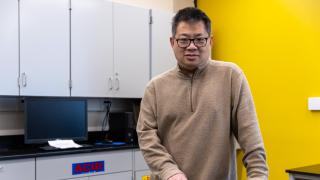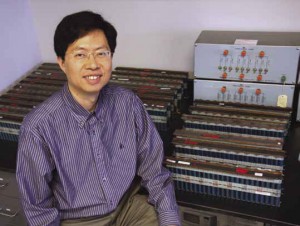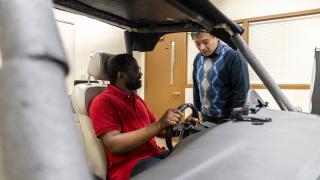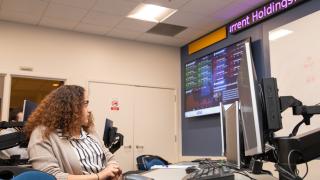

The college is already a nationwide leader in offering courses about hybrid electric vehicles, said Taehyung Kim, the principal investigator on the grant and an assistant professor in the department of electrical and computer engineering. These courses include "Hybrid Electric Vehicles (HEV)," "Electric Machines and Hybrid Drives," "Vehicle Electronics II," "Power Electronics," and "Automotive Sensors and Actuators."
But because of the lack of a hybrid electric vehicle laboratory, instruction about HEV design is confined to classroom discussion and simulation. This grant will change that.
"The lack of hands-on experience makes it difficult for the students to become truly proficient in HEV theory, testing, and measurement practices," Kim said. "The acquisition of state-of-the-art instruments will definitely offer students invaluable hands-on research."
The grant will allow CECS to purchase a real-time hardware-in-the-loop simulator, a battery tester for PHEV battery performance and life-cycle tests, and a test cell data acquisition and control instrument. These tools will be used to conduct further research to develop improved plug-in hybrid electric vehicle technologies.
Specifically, the real-time hardware-in-the-loop simulator is a real-time platform that will be used to design intelligent control systems and perform testing of the controllers for traction motor drives, power converters and power management systems, Kim said.
The battery tester is manufactured to run HEV and PHEV battery modules and cells through a variety of driving cycles, such as the Federal Urban Driving Schedule and the Federal Test Procedure-75. These are cycles established by the federal government to mimic driving conditions, such as those in an urban environment or on a highway, that help predict a battery's efficiency.
The data acquisition and control instrument is the central control system in a modern powertrain test cell, Kim said. It is designed to integrate the other two instruments to execute a predefined test schedule to measure all outputs from sensors on test cell components. It does this by coordinating the real-time simulator, a dynamometer and the battery tester.
The instruments will be used to investigate improvement of the electric motor drive based on intelligent direct toque control, power converter fault detection and compensation schemes, and battery thermal management and digital diagnosis of progressive battery damage.
The research is a multidisciplinary effort. Co-principal investigators on the grant include Dohoy Jung, assistant professor of mechanical engineering; Jie Shen, associate professor of computer and information science; Chris Mi, assistant professor of electrical and computer engineering; Yi Lu Murphey, professor and chair of the department of electrical and computer engineering; Cheol Lee, associate professor of industrial and manufacturing systems engineering; and Roger Shulze, director of the College's Institute for Advanced Vehicle Systems.
At this time, the laboratory does not have an active partnership with any automotive companies. However, Kim said, he plans to pursue partnerships based on the outcomes of his research.
"The outcomes of the proposed project will not only offer a useful and needed research and educational experience that is relevant to the automotive industry of the day, but they will also help to bolster the industry by providing more qualified students," Kim said.
Story reprinted from Dearborn Engineer, a publication of UM-Dearborn's College of Engineering and Computer Science.




